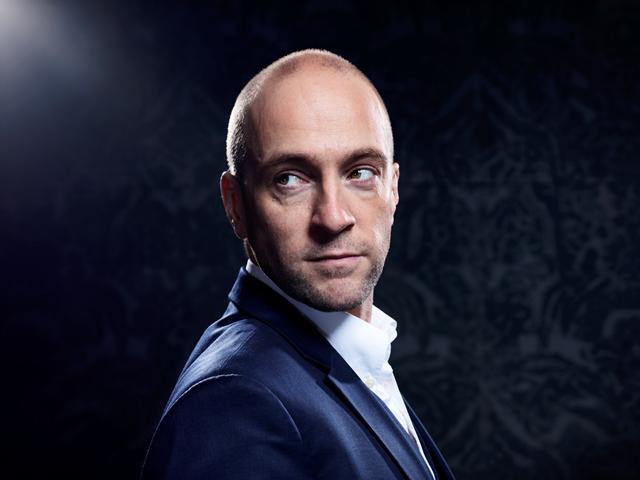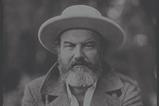The UK's most famous mentalist and illusionist was once a Christian. Derren Brown talks to Justin Brierley about faith, storytelling and whether miracles really happen
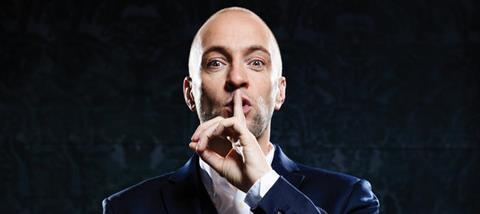
There are many reasons to be nervous about interviewing Derren Brown. But as I wait for him in the hotel where we’re due to meet, it’s not the showman’s terrific fame or powers of illusion that are making my palms sweat. It’s what I had witnessed the previous evening during one of the final nights of his sell-out stage show, Miracle
In the 16 years since his breakthrough TV series Mind Control launched, Brown has established himself as a dazzlingly brilliant, and often controversial, illusionist of stage and screen. But it is his unparalleled ability as a ‘mentalist’ that sets him apart. Using a mixture of suggestion, ‘cold reading’, hypnosis and plain old trickery, Brown has the ability to make people believe in God, miracles and the power of prayer faster than you can say ‘prestidigitation’ (look it up). Yet he is a thoroughgoing atheist himself.
When Brown pulls back the curtain on how susceptible we are to being fooled, it’s only natural for his audience to be left as sceptical as he is about the supernatural. The unsettling question that remains for the religious onlooker is: ‘Could I be imagining all this after all?’
It turns out that Brown is delightful in person, and my initial nerves are soon settled. I crack a joke about him turning me into an atheist by the time we’re done, which he bats away with a roll of his eyes. ‘Boring!’ he laughs. Apparently, the mind control is reserved for stage and TV.
Despite expecting no more than 30 minutes of his time, I end up chatting with him for more than an hour and a half. Despite our differences, we get on like the proverbial house on fire. Brown is engaging, self-deprecating and funny, yet he takes seriously the matters we discuss: why he lost his Christian faith, the evidence for the resurrection and whether his manufactured miracles disprove the divine. Sometimes it’s more like a debate than an interview, but I get the sense that he enjoys talking through theological issues that once mattered to him with someone for whom they still matter.
Although his parents weren’t churchgoers, Brown became a Christian as a child after being sent to Crusader classes. In his teens he attended a charismatic church in Croydon with lifelong friend Nigel Walk, who remains a Christian. Brown says that his own faith allowed his insecure teenage self to adopt an outward identity, which looks brash and conceited in hindsight.
‘Having a Christian identity was one of those things that became, “Well, this is me. You either like it or you don’t.” It didn’t come with any sort of gentleness, but it was there and was quite upfront,’ says Brown.
His faith started to wane at university in Bristol, where Derren fell in love with the stagecraft of illusion and hypnosis. His fellow Christians were not as enthusiastic and warned him off the pursuit, even turning up at one of his first stage shows to pray in tongues loudly at the back.
I would do a hypnosis show and have Christians at the back trying to exorcise me
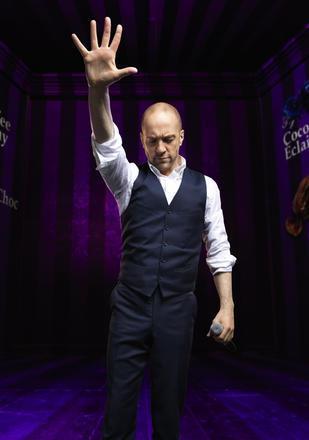
The self-confidence that his fledgling career in stage magic gave him eroded his need for a Christian identity. Brown’s disappointment at the reaction of other believers was also compounded by a sneaking suspicion that he only believed in Christianity because he wanted to. His training as an illusionist had made him realise he was prone to the same confirmation bias (counting the hits and ignoring the misses) that he recognised in psychics, astrologists and all manner of other belief systems he rejected.
‘I thought the difference [was] that there has to be an objective, historical, factual event like the resurrection that separates [Christianity] from just being a subjective circular belief,’ says Brown.
However, when he investigated the historicity of Christ’s resurrection, Brown came away convinced that the evidence he had hoped for wasn’t there (an issue we debated at some length during our conversation). In the end, there was no drawn-out crisis of faith; Brown says he shrugged off his former beliefs remarkably quickly.
However, unlike high-profile atheists such as Richard Dawkins, for whom he expresses admiration, Brown is not primarily known for his non-belief. Ironically, this makes him far more of a threat to faith than a typical, fire-breathing antitheist. Brown isn’t preaching to the sceptical choir. His audience is the unfiltered British public who, like me, stand amazed at the explanation-defying stunts he pulls off on TV and on stage.
Many of his TV shows have been laced with scepticism towards religion. Messiah (2005) and Miracles for Sale (2011) sought to show how people can be fooled into believing in the supernatural. His powers of suggestion were even able to make an atheist believe in God in Fear and Faith (2012). But do these spectacles disprove Christian belief? I don’t think so. A good hypnotist could make someone believe they are God, but that doesn’t prove that God doesn’t exist; just that we are capable of being fooled. Christianity doesn’t consist only of subjective emotional experiences. There are also rational, objective reasons to believe in God and the truth of Christianity. Brown’s main targets are those whose faith resides almost exclusively in experience over evidence.
However, in his Miracle stage show (which began its run in 2015 and is due to air on TV this December), Brown took things even further. Prepare to be amazed, but also to encounter a very specific and uncomfortable challenge to charismatic Christianity.
The first half of Miracle consists of the sort of illusions Brown seems to be able to pull off with his eyes closed: random words volunteered by the audience turn up in the local paper; a woman is persuaded to eat glass shards from a light bulb; and there’s a nerve-jangling trick involving spikes and paper bags. Yes, it’s extraordinary, but it’s well within the usual range of Brown’s skill.
The second half is where the show’s religious dimension really takes off. Having given an introduction to what he regards as the corrupt industry of prosperity preaching TV healers (Benny Hinn comes in for specific criticism), Brown himself adopts the persona of a healing evangelist. The audience is invited to ‘just go with it’ by participating in an extended exercise involving bright lights and motivational music intended to flood us with feel-good emotions. Then, those who believe they have experienced some sort of healing are invited forwards. A queue of volunteers quickly forms at the side of the stage.
Numerous people testify to ailments that have been healed: short-sightedness is cured, tinnitus disappears and a man with a sprained foot is able to walk without any pain. Brown is often able to identify the problems before he is told them and calls out illnesses in the audience that are being healed (a ‘word of knowledge’ in charismatic parlance). No stooges are used, we are told, and I’m inclined to believe him. Apparently, the only person acting is Brown who, backed by the organ strains of an old-time gospel song, seems to relish the role of speaking in tongues, casting out demons and slaying people in the spirit. For most Christians it will come across as mocking at best and blasphemous at worst, though Brown says the target of his act is to send up the charlatans and frauds, not sincere believers.
Ultimately, I’m left feeling amazed but also uncomfortable. Evidently, by creating a euphoric state in the audience, Brown has been able to replicate much of what occurs during a typical charismatic healing rally. Undoubtedly, most of those present will find their aches and pains return once the adrenalin rush subsides.
It comes down to whether the resurrection was a real event
So does this prove that real miracles don’t, in fact, occur? That it’s all a con? No, it doesn’t, as Brown himself is happy to admit. But one can’t avoid coming to the conclusion that crowd dynamics play their part in Christian healing events, and that those who want to affirm miracles need to produce evidence that the healing lasts beyond the event itself.
Despite Brown’s amazing abilities, I still believe in miracles. While Christians should rightly heed his warning to confront charlatanism within their ranks, neither should we throw the baby out with the prosperity preacher bathwater. I believe convincing evidence can be presented for many miraculous healings (we debate one specific case during our conversation). Nor do hyped-up charismatic events represent the majority of environments in which healings actually take place. Most of the stories I hear originate in unremarkable meetings or individual encounters.
Brown insists that his show is not aimed at attacking the beliefs of Christians, but I can’t avoid coming to the conclusion that the average unchurched observer is likely to leave the theatre with a dim view of Christianity in general. Brown concludes the show by urging his audience to look to themselves rather than God for the ultimate example of a miracle. During our interview he often speaks of humans being ‘story-forming creatures’, and that the story we believe about ourselves is what matters.
Personally, I’ve never been convinced that the atheist story of humanity – in which we are the accidental by-product of a universe that came from nowhere and is heading towards inexorable extinction – makes more sense than the Christian one. Of course, that story of ultimate meaning, purpose and hope rests on the miracle that forms the central historical claim of Christianity.
The illusionist doesn’t begrudge Christians their story; he believed it once himself. Brown says: ‘It’s enormously helpful to people, I’m sure,’ but adds, ‘For me, it comes down to whether the resurrection was a real event.’ While we disagree on whether the evidence for that miracle is convincing, Brown, myself and the apostle Paul are in complete agreement on this at least: that if Christ has not been raised, our faith is in vain.
Miracle is an amazing show. My worry is for the person who could get the impression that Christianity is just emotion and hype. Obviously, there are also good things about Christianity. Is there a danger of the pendulum swinging too far?
Well, I am an atheist. In a way it’s not my job to defend the Christian faith! I make it clear in the show that this is not in any way against the Church or religion, or even the idea of healing. This is a scam that’s carried out against the Church and exploits those with sincerely held faith.
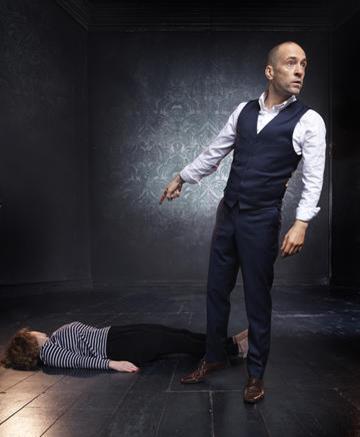
There were 1,200 people at last night’s show. I wonder how many left thinking that you’ve clearly shown that Christianity is all stuff and nonsense?
The reality is that a lot of churches nowadays do rely on sensationalism and personal experience. I remember standing there when we were all being told to speak in tongues. The guy said: ‘Just start talking and make a noise. If something in the back of your mind tells you that you’re just being silly then that’s the devil telling you that.’ Even then, as a 20-year-old, I thought it was a crowd-manipulation technique. Not to belittle much richer religious experience, but that is sadly quite typical.
You arrived at university as a pretty committed Christian. What happened?
Yes, but only in a very personal sense. I wasn’t particularly evangelical about it. One of the reasons I got into magic and hypnosis is that if you don’t feel very impressive in yourself, magic and hypnosis are very appealing because they’re very controlling and make you look amazing.
I had, what seemed to me, a strange reaction from my fellow Christians in the CU of absolute horror. I would do a hypnosis show and have Christians at the back talking in tongues and trying to exorcise me. I thought it was just based in fear and ignorance, but that planted a seed of alienation.
At the same time I had a good friend who was and still is a psychic healer. I could look at that and see how she was maintaining a circular belief: confirmation bias. You ignore the evidence that doesn’t support it. But, I thought: ‘How is that any different from what I’m doing [as a Christian]?’
I think there are many ways of sustaining a Christian or any other religious belief without this, but for me I thought the difference is that there has to be an objective, historical, factual event rooting it, like the resurrection, that separates it from just being a subjective circular belief.
Up until then, I’d read a few books written by Christian apologists that make you feel like it’s a very well-tested historical event. But the moment you look outside of that and actually look at how the Bible was put together, it’s a very different story. I wanted to undo those glib answers. I knew I could go to church every Sunday and be given a lot of emotive truisms. But, if anything, you’re encouraged not to ask questions.
Do you feel that if your church had had a more intellectually robust engagement with these issues you might have been able to stay in the Christian faith?
I don’t know. It would be nice to think that, but I wouldn’t want to blame it on the fact that it was happy-clappy churches. Equally, they probably kept me going for longer too.
I personally believe that there are strong arguments for the historical reliability of the Gospels, specifically around the death and resurrection of Jesus. But you start your biography Tricks of the Mind (Channel 4) with the words: ‘The Bible is not history’. What was the process that led you to take that view?
You’re dealing with hagiography. It’s not written as history. These are sacred stories that are there to show a divine person. It’s that sort of genre. So it’s the equivalent of a cult springing up now around a soldier in World War Two who had died and been resurrected and the evidence they gave you for that was some anonymous, second-hand, written information in the 1980s. How seriously would you be expected to take it?
That analogy isn’t quite the same because what resulted for Jesus’ followers was a very different theological view; one that went against their Jewish expectations. It seems an odd thing to make up. A risen messiah wasn’t what they were looking for.
But Paul doesn’t talk about physical resurrection. For me, a much more likely scenario is that of a spiritual resurrection. If you don’t look at Christian writings but look at historical writings, the idea of a resurrection isn’t even mentioned until AD110 by Pliny the Younger. There’s a mention of the religion but no mention of the resurrection. It’s not until mid-second century [that] even the idea of the mention of the physical resurrection even appears.
Within the Jewish context that Christianity came from, there was a belief in physical resurrection at the end of time. From everything I can see, Paul seems to understand it very much as a physical resurrection.
I don’t think Paul gives a very clear idea of that at all. He only seems to talk about visions, and things that he describes seem to be very understandable as spiritual. At very best there’s a huge question mark over what that is.
Irrespective of that, one can still live, I’m sure, a very strong Christian faith regardless of how you take that. But that was my journey through it. That was the one thing I was looking for because it was the one thing, for me, that separated it from somebody saying they were psychic for all their own reasons.
Do you have the will to reinvestigate it?
It is a background interest. For me, what’s interesting is the history of ideas, what Christianity did. I’m writing a book on what it means to be happy, the good life, and how that idea got hijacked for a couple of thousand years. That’s more interesting than what people choose to believe.
Got Questions?
Here are some books and websites that tackle key questions about Christian faith and atheism.
The Atheist Who Didn’t Exist: Or the Dreadful Consequences of Bad Arguments (Monarch Books) - Andy Bannister humorously spells out some of the problems of an atheistic world view
Benefit of the Doubt: Breaking the Idol of Certainty (Baker Books) - Everybody doubts. Gregory Boyd helps readers understand why doubt isn’t the enemy of faith
Unapologetic: Why, Despite Everything, Christianity Can Still Make Surprising Emotional Sense (Faber & Faber) - If you don’t mind a few swear words, Francis Spufford’s polemical book is a refreshing manifesto for belief
Not God’s Type: An Atheist Academic Lays Down Her Arms (Ignatius Press) - Holly Ordway describes her journey from atheism to Christianity via CS Lewis and JRR Tolkien
Why Trust The Bible? Answers to 10 tough questions (IVP) - Amy Orr-Ewing’s helpful guide to the evidence for the Gospels and the resurrection
The Resurrection of Jesus: A New Historiographical Approach (IVP) - For in-depth scholarship, read Michael Licona’s research on the resurrection
Did coming to terms with your sexuality play a role in you rejecting Christianity?
Around the time that I was going to these happy-clappy churches and coming to terms with the fact that I was gay, I came across the whole world of ‘healing you from being gay’. Although I think it’s tragically misguided, what was interesting is the Church trying to engage with something that might be painful and difficult for young people rather than just saying ‘Go away and read your Bible’. They were saying there’s a spiritual model for this and here’s something you can engage with and we want to listen to you. That’s great on the one hand. On the other hand, I think it brings pain and damage with it. There was never any real evidence that it worked.
At the time it was plausible because it was the only thing that was around that was actually saying it’s a difficult and complex thing, and offering support. If anything it kind of attracted me more to the Church because it was trying to give a helpful answer, albeit a very misguided one. So I never saw a conflict with that.
At the start of Miracle, you say: ‘Life isn’t ultimately about the goal. It’s about the journey and it’s about dancing to the music.’ But as an atheist, is it legitimate to say that life is about anything?
I think that’s a really good question. Finding personal meaning is huge in life. We are story-forming creatures and we desperately need to find that. One of the doubled-edged gifts of the enlightenment is that we’ve dispensed with a lot of superstitious thinking, but we’ve also dismissed the more useful side of myth-forming and cultural narratives. For example, when we come to death, if you don’t have a religious belief you’re left with something that could be quite alienating and frightening for people. The medical profession’s job now is to sustain life, but that’s not really the same as quality of life.
What are we extending it for?
Exactly. What’s important in those last times is that we’re able to find authorship of our own stories. When you get to the end of a novel it finishes meaningfully and it makes sense of the story. It doesn’t necessarily happen with life. We’re not necessarily led to understand [that] those things are important.
Other people become the authors of our last chapters before we die...doctors and family...We can end up feeling like cameo parts in someone else’s story, and that’s horrendous. I think it’s hugely important to find meaning; not just at the end of life, but throughout life too.
But as an atheist you wouldn’t say there is a meaning out there to be discovered?
I don’t think there’s an objective meaning; certainly not one revealed through anonymous stories written 2,000 years ago. But I do think that there are reasons why the stories have remained and there are reasons why myths are important to us. We need to find those things for ourselves that give our lives a sense of meaning, but also allow the different parts of us to flourish. Finding our own story is important.
For me, it is faith in Christ that gives me that story. The tragedy is that many people go through life with a very impoverished story to live out.
The key is that whatever story you find yourself in should allow your life to be lived large. It should allow you to become a better version of yourself.
Let’s talk about Miracle. You were demonstrating how the effects that we often see in the charismatic healing world can effectively be reproduced by a combination of suggestion, manipulation and illusion. Do you think healing is always a psychological effect?
Ultimately, what makes those events work is the personal psychological experience that people are going through. If you’re made to feel adrenalin it kills pain. I knew this, and I’d seen it work over and over again in these events.
I went out on the first night armed with all this theoretical knowledge. I thought that if I could create some type of adrenalin then someone with a bad back is going to tell me that they can’t feel the pain. That’s a chemical thing.
I found not only would somebody come up and say they didn’t have a bad back, but they would also hit the floor when I touched them on the face because they have a certain expectation. When you go to these events as a believer you know what’s supposed to happen. So I show clips of people doing that. By the time they come up on stage, there’s a similar expectation of what they’re supposed to do. And then it just started happening night after night.
So ultimately it’s due to the adrenalin rush?
In those events, yes. That’s how it happens. Regardless of what you believe God can do outside of that, those events are not what they appear to be, because I (as an infidel) am going out and doing it with unbelievers every night.
But can you extrapolate that to all miracle claims and say there is no actual healing ever going on from God?
Of course, that’s the question, isn’t it? How do you judge what a miracle is? There’s the objective way and the subjective way.
With the objective way it’s very easy to tell if those faith healers are doing anything because you can look at X-rays and faith healing results and nothing happens. If someone has a remission in cancer, is that a miracle? It might absolutely be a miracle to that person’s family, even more so if they happen to have been praying for that. Also, in the same breath, remissions happen. That’s what remissions are.
Then you’re into a more subjective area, where you apply meaning to the event. That, ultimately, is always more compelling than data, evidence and medical charts because we have to find meaning and tell ourselves stories.
To me, a miracle is someone’s arm growing back or an actual [physical] difference. I’m sceptical, but I do think those meanings and stories we tell ourselves are hugely important, so I’m not decrying them.
I have heard many stories of miraculous physical change. In 2001, during a mission trip in Peru, a friend of mine, Alex, witnessed an eyeball grow back into the socket of a man that he and a woman prayed for. I don’t believe he’s lying. He’s generally a sceptical guy, but he couldn’t deny what he experienced. What do you think of Alex’s story?
It’s an amazing story; a story that happened 15 years ago, and I’m sure that was his absolute memory of it.
When I was a student, I saw a magician perform a trick in which he pushed a lit cigarette through someone’s jumper and out the other side, still lit. When I later became a magician I came across a well-known trick whereby a lit cigarette could be pushed into a jumper and then caused to vanish without any damage, but I had no clue how he had seemingly pushed it through. Years later I met the magician in question and asked him about it, and he said he had only ever performed the more familiar trick with the ‘vanish’, and had no idea either how anyone would have been able to push it through. It just didn’t happen.
I think the key is that the story of ‘cigarette through jumper’ is simpler, clearer and more compelling than ‘cigarette is pushed into the jumper and vanishes’. Therefore, people, including me, tend to remember the more compelling story. I would have sworn blind (no pun intended) that I saw the trick that never happened.
In the end, you don’t begrudge Christians the stories that make sense of their lives?
No, I think Christianity can do that very well. Schopenhauer talks about it being a kind of really useful folk myth. But, it has to be presented as real in order for it work and have a real effect. That might sound very patronising, of course, if you believe it to be real. But at its heart it’s articulating a sense of story and meaning that’s useful. It’s not up to me to say whether anyone should take anything from that or not. But, of course it’s there and it’s enormously helpful to people, I’m sure.
Hear the full two-part interview with Derren Brown on Unbelievable? on Premier Christian Radio on Saturdays 27th August and 3rd September at 2.30pm, or listen again at premierchristianradio.com/unbelievable
Images: Clout Communications













